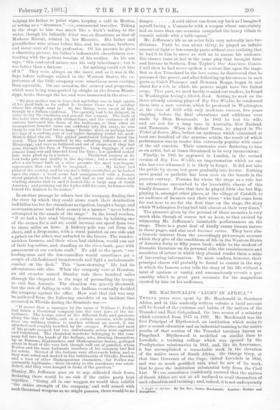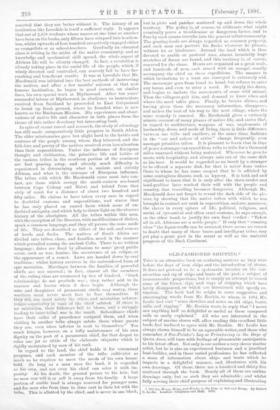MR. MACDONALD'S " LIGHT IN AFRICA."' Tweeve years were spent
by Mr. Macdonald in Southern Africa, and in this modestly written volume a lucid account will be found of the customs and habits of the natives of the Transkei and East Griqualand, the two scenes of a ministry which extended from 1875 to 1887. Mr. Macdonald was the first Principal of Blythswood, an institution which seeks to give a sound education and an industrial training to the native youths of that section of the Transkei territory known as Fingoland. Blythswood is modelled on similar lines to Lovedale, a training college which was opened by the Presbyterian missionaries in 1841, and, like its forerunner, it has accomplished a remarkable work in the elevation of the native races of South Ahem. Sir George Grey, at that time Governor of the Cape, visited Lovedale in 1856, and was so much gratified with what he saw of its work, that he gave the institution substantial help from the Civil List. We arc sometimes confidently assured that the natives of South Africa are not at all inclined to avail themselves of such education and training; and, indeed, it is not unfrequently * Light in Africa. By the Rev. Jams Macdonald, London; Hodder and Stoughton.
asserted that they are better without it. The history of an institution like Lovedale is itself a sufficient reply. It appears that out of 2,458 students whose names at one time or another have been on the books, only fifteen have relapsed into heathen- ism, whilst upwards of four hundred are actively engaged either as evangelists or as school-teachers. Gradually an educated class is arising in the midst of the native community, and as knowledge and mechanical skill spread, the whole aspect of African life will be silently changed. In fact, a revolution is already taking place in the social life of the people, which, if wisely directed and controlled, can scarcely fail to have far- reaching and beneficent results. It was at Lovedale that Mr. Macdonald was initiated into the best methods of instructing the natives, and after a few months' sojourn at that now famous institution, he began in good earnest, on similar lines, his own special work at Blythswood. After ten years' successful labour at Blythswood, in obedience to instructions received from Scotland he proceeded to East Griqualand to break up fresh ground, where he founded what is now known as the Buchanan Mission. His experiences and obser- vations of native life and character in both places form the theme of this rather desultory but interesting book.
In spite of recent travel and research, the study of ethnology has still made comparatively little progress in South Africa. The older missionaries gave but slight heed to the habits and customs of the people among whom they laboured, and the folk-lore and poetry of the natives received even less attention than their superstitious. Under the influence of European thought and civilisation, the primitive life and habits of the various tribes in the southern portion of the continent are fast passing away, and already much difficulty is experienced in determining what is ancient and strictly African, and what is the outcome of European influence. The tribes with which Mr. Macdonald came most into con- tact, are those which occupy the south-eastern sea-board between Cape Colouy and Natal, and inland from that strip of coast for a distance of about two hundred and fifty miles. He claims to have taken every care in regard to doubtful customs and superstitions, and states that he has only placed on record facts which seem of un- doubted antiquity, and which help to throw light on the obscure history of the aborigines. All the tribes within this area, with the exception of the Basutos, with modifications of dialect, speak a common language, and they all pursue the same mode of life. They are described as tillers of the soil, and owners of herds and flocks. The natives of South Africa are divided into tribes, clans, and families, much in the manner which prevailed among the ancient Celts. There is no written language; dates are fixed by allusions to some great public event, such as war, famine, the occurrence of an eclipse, or the appearance of a comet. Laws are handed down by oral tradition ; whilst history survives in the embroidered form of epic narration. Marriages between the families of powerful chiefs are not unusual ; in fact, almost all the members of the ruling class are connected by ties of kindred. "Such relationships do not preclude war ; they rather add to its rancour and horror when it does begin. Although the sons and daughters of paramount chiefs may marry, these worthies must never meet face to face themselves. If they did, one must salute the other, and salutation acknow- ledges superiority in rank of the chief saluted. If there is no salutation, their followers fall to blows, and a struggle leading to inter-tribal war is the result. Subordinate chiefs have their order of precedence assigned them, and when visiting in another tribe always salute those whose guests they are, even when inferior in rank to themselves." Too much hinges, however, on a lofty maintenance of his own dignity on the part of a paramount chief, for that despot to relax one jot or tittle of the elaborate etiquette which is rigidly maintained by men of his rank. In regard to the land, the chief holds it for communal purposes, and each member of the tribe cultivates as much as he requires to meet the needs of his own house- hold. So long as a man uses the land, it is regarded as his own, and not even his chief can seize it with im- punity. At his death, the ground passes to his heir, but no man can will it or sell it away from his family. A large portion of amble land is always reserved for younger sons, and for men who from time to time cast in their lot with the tribe. This is allotted by the chief, and is never in one block, but in plots and patches scattered up and down the whole territory. The policy is, of course, to obliterate what might eventually prove a troublesome or dangerous factor, and to fuse by such means recruits into the general tribal community. The grazing-lands are always regarded as common property, and each man can pasture his flocks wherever he pleases, without let or hindrance. Around the land which is thus devoted to arable or pastoral uses, almost invariably huge stretches of forest are found, and this territory is, of course, reserved for the chase. Hants are organised on a great scale, and hundreds of men, each armed with an assegai, usually accompany the chief on these expeditions. The manner in which invitations to a hunt are conveyed is extremely odd. The messenger goes from kraal to kraal, but refuses to enter any house, and even to utter a word. He simply lies down, and begins to imitate the movements of some wild animal. Then the villagers pelt him, and demand to know when and where the meet takes place. Finally, he breaks silence, and having given them the necessary information, disappears, and makes the best of his way to the next village, where the same comedy is enacted. Mr. Macdonald gives a curiously minute account of many phases of native life, and states that, in regard to architecture, weapons of war, implements of husbandry, dress, and mode of living, there is little difference between one tribe and another; at the same time, fashions in the " cut and colour of attire" change frequently, even amongst primitive tribes. It is pleasant to learn that in time of peace a stranger can travel from tribe to tribe for a thousand miles unarmed without being molested. Wherever he goes he meets with hospitality, and always eats out of the same dish as his host. It would be regarded as an insult by a stranger to be offered a separate dish, for that is never done unless those to whom he has come suspect that he. • is afflicted by some contagious disease, such as leprosy. It is both sad and significant to learn that it is only after the slave-trader and land-grabber have worked their will with the people, and country, that travelling becomes dangerous. Although Mr. Macdonald does not forget to reveal the dark side of the pic- ture, by showing that the native tribes with which he was brought in contact are sunk in superstition, and are, moreover, the slaves in every sphere of life, political, religious, and social, of, tyrannical and often cruel customs, he says enough, on the other hand, to justify his own final verdict : " Taken all in all, Africans are a noble people." If only that " running ulcer " the liquor-traffic can be arrested, there seems no reason to doubt that many of these brave and intelligent tribes may yet play a great part in the moral as well as the material progress of the Dark Continent.











































 Previous page
Previous page